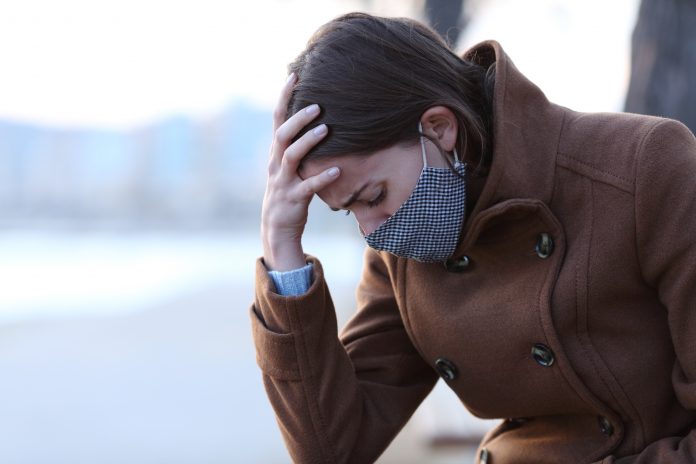NHS GP and lead GP at Numan, Dr Luke Pratsides tells us everything he knows about the symptoms of long COVID and what’s being done to tackle this novel disease
With over 200 million cases of COVID-19 across the globe, this brutal disease has debilitated societies, economies, and lives. For a lot of people, recovery takes a few days – but not for everyone. As the unwelcome presence of COVID-19 lingers, a growing number of people suffer from prolonged symptoms of the disease – also known as post-COVID-19 syndrome or long COVID.
Dr Luke Pratsides is a GP in a busy east London medical practice, and the lead GP at men’s health clinic, Numan. He’s noted the unpredictability of long COVID sufferers. “I had a patient who was only 30 – very fit and healthy. Having COVID completely transformed her life. She went from being an active young adult to having to sit on the end of her bed to get her breath back after getting up in the morning. Just a short walk was challenging for her.”
Dr Luke explains that in cases such as this, he’ll begin by looking at chest x-rays and oxygen levels. “Given the symptoms, you’d expect to see some sort of abnormalities with the lungs so initially, we’ll take chest x-rays and look out for lung inflammation. But I’m seeing cases such as this where the x-rays are coming back normal and they’re getting 100% oxygen levels on their tests, yet they can’t sit up in bed without getting breathless. This is when I would refer a patient to a long COVID clinic where they can get specialist attention and a more detailed view of their lungs.”
Long COVID clinics have been set up across the nation to provide patients with specialist care and assist our understanding of how and why long COVID arises, and what can be done to treat it. These clinics are multidisciplinary with doctors, nurses, physiotherapists, and occupational therapists working to understand and rehabilitate patients with the condition.
Although research on viral infection and persistent symptoms has never been done on such an unprecedented scale before, this is not the first time a viral infection has been linked to chronic disease. Before the COVID-19 outbreak, research was being done to establish a possible link between a virus and chronic fatigue syndrome. “For people that were researching that link, this relationship between COVID-19 and chronic fatigue has added some fuel to the theory,” notes Dr Luke.
The symptoms of long COVID vary but there are certain symptoms that are much more common than others. “Sometimes, new symptoms emerge that the patient didn’t have to begin with and this becomes the long-term symptom that they struggle to recover from,” explains Dr Luke.
The common symptoms of long COVID include:
- Fatigue (in severe cases, you might have a small fraction of the energy that you used to have)
- Shortness of breath
- Chest pains (feeling unable to fully expand your chest)
- Brain fog (feeling sluggish, confused and lacking mental clarity)
- Joint pain
- Skin rashes
- Insomnia (difficulty sleeping)
- Depression and anxiety
- Loss of smell or taste
Although we’re still scrambling to understand why some people experience long COVID while others don’t, emerging research has spotted various trends. Scientists have investigated how the immune response can predict the severity of COVID with a UK study revealing women are more likely to suffer from long COVID than men. Dr Luke notes socio-economic factors, like multiple generations sharing the same household, also put black and ethnic minority groups at greater risk of severe COVID, having seen an ethnicity disproportionality in his practice.
One of the most commonly reported prolonged symptoms is a loss of sense of smell. This can be damaging on mental health and put people at risk of missing warnings of a fire or gas leak. Dr Luke explains, “There is something called ‘smell training’ that we’re advocating for people to do who have lost their sense of smell from long COVID. It’s about gradually introducing smells. They’re quite strong smells initially and then more subtle smells. It’s a well-known technique – smell training. It’s not going to be an instant thing, it’s going to be gradual.”
Psychiatric symptoms are common for people infected with COVID-19, with depression and anxiety often reported as symptoms. It’s thought that COVID-19 attacks the brain and in extreme cases, can cause inflammation of the brain. This has informed the operation of long COVID clinics where they conduct psychological assessments and provide mental health support.
Aside from the physical damage to mental health, the emotional strain of the pandemic is fuelling a rise in depression, with an increase in people reporting burnout (work-related stress) and anxiety about the pandemic in general. As all these factors interplay, Dr Luke warns long COVID patients to get in touch with their GP.
He adds, “There’s a lot of help out there. The NHS is here for you. Don’t suffer in silence.”
Kirsty Mason
Junior SEO Copywriter
Numan








